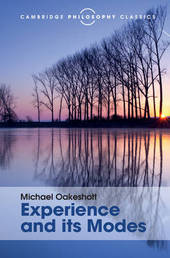
|
Experience and its Modes
Hardback
Main Details
Description
When it first appeared in 1933, Experience and its Modes was not considered a classic. But as philosophical fashion moved away from the analytic philosophy of the 1930s, this work began to seem ahead of its time. Arguing that experience is 'modal', in the sense that we always have a theoretical or practical perspective on the world, Michael Oakeshott explores the nature of philosophical experience and its relationship to three of the most important 'modes' of non-philosophical experience - science, history and practice - seeking to establish the autonomy and superiority of philosophy. In recognition of its enduring importance, this book is presented in a fresh series livery for a new generation of readers, featuring a specially commissioned preface written by Paul Franco.
Author Biography
Michael Oakeshott (1901-90) was a philosopher and a political theorist who wrote widely on the philosophy of aesthetics, education, history, law, political philosophy and religion. He is perhaps best known as a conservative political and social thinker.
Reviews'Mr Oakeshott's thesis ... is so original, so important and so profound that criticism must be silent until his meaning has been long pondered ... the chapter on history is the most penetrating analysis of historical thought that has ever been written ... the whole book shows Mr Oakeshott to possess philosophical gifts of a very high order, coupled with an admirable command of language; his writing is as clear as his thought is profound, and all students of philosophy should be grateful to him for his brilliant contribution to philosophical literature.' R. G. Collingwood, The Cambridge Review
|